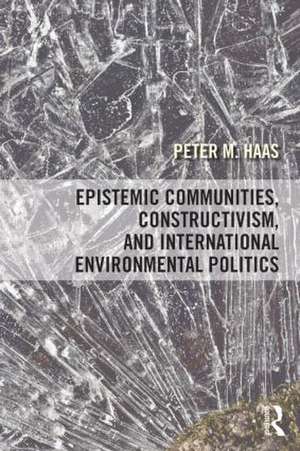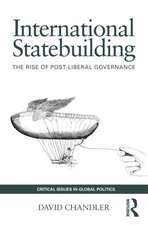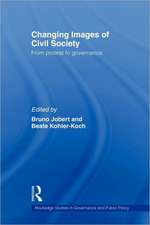Epistemic Communities, Constructivism, and International Environmental Politics
Autor Peter Haasen Limba Engleză Paperback – 17 aug 2015
In addition to detailing the changes in the international system since the Industrial Revolution, Haas discusses the technical nature of global environmental threats. Providing a critical reading of discourses about environmental security, this book explores governance efforts to deal with global climate change, international pollution control, stratospheric ozone, and European acid rain. With a new general introduction and the addition of introductory pieces for each section, this collection offers a retrospective overview of the author’s work and is essential reading for students and scholars of environmental politics, international relations and global politics.
| Toate formatele și edițiile | Preț | Express |
|---|---|---|
| Paperback (1) | 455.23 lei 6-8 săpt. | |
| Taylor & Francis – 17 aug 2015 | 455.23 lei 6-8 săpt. | |
| Hardback (1) | 1008.17 lei 6-8 săpt. | |
| Taylor & Francis – 24 aug 2015 | 1008.17 lei 6-8 săpt. |
Preț: 455.23 lei
Nou
Puncte Express: 683
Preț estimativ în valută:
87.12€ • 90.62$ • 71.92£
87.12€ • 90.62$ • 71.92£
Carte tipărită la comandă
Livrare economică 15-29 aprilie
Preluare comenzi: 021 569.72.76
Specificații
ISBN-13: 9781138858558
ISBN-10: 1138858552
Pagini: 420
Ilustrații: 8 black & white illustrations, 35 black & white tables, 8 black & white line drawings
Dimensiuni: 156 x 234 x 36 mm
Greutate: 0.59 kg
Ediția:1
Editura: Taylor & Francis
Colecția Routledge
Locul publicării:Oxford, United Kingdom
ISBN-10: 1138858552
Pagini: 420
Ilustrații: 8 black & white illustrations, 35 black & white tables, 8 black & white line drawings
Dimensiuni: 156 x 234 x 36 mm
Greutate: 0.59 kg
Ediția:1
Editura: Taylor & Francis
Colecția Routledge
Locul publicării:Oxford, United Kingdom
Public țintă
Postgraduate and UndergraduateCuprins
Preface 1. Introduction "ReConstructing Epistemic Communities" Part I: Ontology & Historical Background 2. Transnational Flows and the Transformation of International Relations 3. The Capacity of International Institutions to Manage Bhopal-like Problems 4. Introduction: Epistemic Communities and International Policy Coordination 5. Constructing Environmental Security from Resource Scarcity Part II: Regimes and Governance Patterns 6. Social Constructivism and the Evolution of Multilateral Environmental Governance 7. Prospects for Effective Marine Governance in the NW Pacific Region and "Letter to the Editor" 8. Epistemic Communities and International Environmental Law Part III: Institutions and Learning 9. UN Conferences and Constructivist Governance of the Environment 10. International Institutions and Social Learning in the Management of Global Environmental Risk 11. Addressing the Global Governance Deficit 12. Learning to Learn Part IV: Effectiveness 13. Choosing to Comply 14. Evaluating the Effectiveness of Marine Governance V: Science Policy 15. When Does Power Listen to Truth? A Constructivist Approach to the Policy Process 16. Organized Science, Usable Knowledge, and Multilateral Environmental Governance Part VI: Conclusion 17. Promoting Knowledge Based International Governance for Sustainable Development 18. The Global Spreading of Ideas
Notă biografică
Peter M. Haas is a professor of political science at the University of Massachusetts Amherst. He received his Ph.D in 1986 from MIT, and has been at UMASS since 1987. He has had visiting positions at Yale University, Brown, Oxford, and the Wissenschaftszentrum, Berlin. He has published on international relations theory, constructivism, international environmental politics, global governance, and the interplay of science and international institutions at the international level. He was awarded the 2014 Distinguished Scholar Award from the Environmental Studies Section of the International Studies Association.
Recenzii
Bringing together some of his most important writings during the last quarter of century, one of the leading scholars of epistemic communities and environmental politics offers a modestly hopeful picture of gradual social learning under conditions of structural change. Scholars interested in some of the best thinking about a vitally important issue in world politics will rely on this collection for many years to come.
Peter J. Katzenstein, Walter S. Carpenter, Jr. Professor of International Studies, Cornell University, USA
This volume brings together many of Peter Haas's papers along with a new and lucid introduction tracing the epistemic communities research program that he has pioneered over the last quarter-century.
Robert O. Keohane, Professor of International Affairs, Princeton University, USA
Peter Haas has pioneered the study of advocacy groups with claims to consensual knowledge ("epistemic communities") in shaping international cooperation and institution-building. Moreover, he has been among the first to examine international environmental cooperation from a rigorous theoretical perspective. This timely collection of his essays showcases the intellectual development of one of the giants in the field.
Thomas Risse, Professor of International Politics, Freie Universität Berlin, Germany
Peter J. Katzenstein, Walter S. Carpenter, Jr. Professor of International Studies, Cornell University, USA
This volume brings together many of Peter Haas's papers along with a new and lucid introduction tracing the epistemic communities research program that he has pioneered over the last quarter-century.
Robert O. Keohane, Professor of International Affairs, Princeton University, USA
Peter Haas has pioneered the study of advocacy groups with claims to consensual knowledge ("epistemic communities") in shaping international cooperation and institution-building. Moreover, he has been among the first to examine international environmental cooperation from a rigorous theoretical perspective. This timely collection of his essays showcases the intellectual development of one of the giants in the field.
Thomas Risse, Professor of International Politics, Freie Universität Berlin, Germany
Descriere
Epistemic Communities, Constructivism and International Environmental Politics brings together 25 years of publications by Peter M. Haas. The book examines how the world has changed significantly over the last 100 years, discusses the need for new, constructivist scholarship to understand the dynamics of world politics, and highlights the role played by transnational networks of professional experts in global governance. Combining an intellectual history of epistemic communities with theoretical arguments and empirical studies of global environmental conferences, as well as international organizations and comparative studies of international environmental regimes, this book presents a broad picture of social learning on the global scale.















